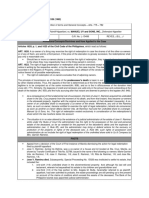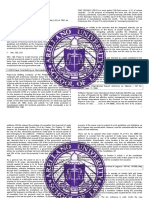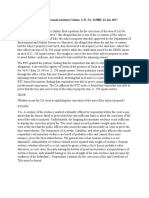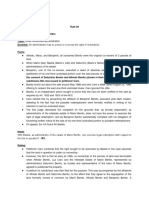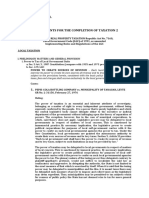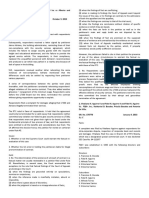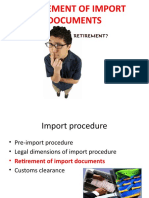0 ratings0% found this document useful (0 votes)
61 viewsButuan Sawmill vs. CTA
Butuan Sawmill vs. CTA
Uploaded by
Rhea CagueteThe Court upheld the assessment of sales tax against Butuan Sawmill for sales made from 1951 to 1953. Butuan Sawmill argued the assessment had prescribed because it filed income tax returns reporting the sales. However, the Court found that an income tax return is not sufficient to qualify as a return for sales tax purposes. Since Butuan Sawmill did not file sales tax returns, the Bureau of Internal Revenue could assess sales tax within 10 years of discovering the omission to file as provided under Section 332(a) of the Tax Code. As the assessment was made within 10 years in 1957, it was not yet prescribed. The petition was dismissed.
Copyright:
© All Rights Reserved
Available Formats
Download as PDF, TXT or read online from Scribd
Butuan Sawmill vs. CTA
Butuan Sawmill vs. CTA
Uploaded by
Rhea Caguete0 ratings0% found this document useful (0 votes)
61 views2 pagesThe Court upheld the assessment of sales tax against Butuan Sawmill for sales made from 1951 to 1953. Butuan Sawmill argued the assessment had prescribed because it filed income tax returns reporting the sales. However, the Court found that an income tax return is not sufficient to qualify as a return for sales tax purposes. Since Butuan Sawmill did not file sales tax returns, the Bureau of Internal Revenue could assess sales tax within 10 years of discovering the omission to file as provided under Section 332(a) of the Tax Code. As the assessment was made within 10 years in 1957, it was not yet prescribed. The petition was dismissed.
Original Title
11. Butuan Sawmill vs. CTA
Copyright
© © All Rights Reserved
Available Formats
PDF, TXT or read online from Scribd
Share this document
Did you find this document useful?
Is this content inappropriate?
The Court upheld the assessment of sales tax against Butuan Sawmill for sales made from 1951 to 1953. Butuan Sawmill argued the assessment had prescribed because it filed income tax returns reporting the sales. However, the Court found that an income tax return is not sufficient to qualify as a return for sales tax purposes. Since Butuan Sawmill did not file sales tax returns, the Bureau of Internal Revenue could assess sales tax within 10 years of discovering the omission to file as provided under Section 332(a) of the Tax Code. As the assessment was made within 10 years in 1957, it was not yet prescribed. The petition was dismissed.
Copyright:
© All Rights Reserved
Available Formats
Download as PDF, TXT or read online from Scribd
Download as pdf or txt
0 ratings0% found this document useful (0 votes)
61 views2 pagesButuan Sawmill vs. CTA
Butuan Sawmill vs. CTA
Uploaded by
Rhea CagueteThe Court upheld the assessment of sales tax against Butuan Sawmill for sales made from 1951 to 1953. Butuan Sawmill argued the assessment had prescribed because it filed income tax returns reporting the sales. However, the Court found that an income tax return is not sufficient to qualify as a return for sales tax purposes. Since Butuan Sawmill did not file sales tax returns, the Bureau of Internal Revenue could assess sales tax within 10 years of discovering the omission to file as provided under Section 332(a) of the Tax Code. As the assessment was made within 10 years in 1957, it was not yet prescribed. The petition was dismissed.
Copyright:
© All Rights Reserved
Available Formats
Download as PDF, TXT or read online from Scribd
Download as pdf or txt
You are on page 1of 2
Butuan Sawmill vs.
CTA (1966) section 186 of the Tax Code, as amended by Republic
Acts Nos. 588 and 594; and that the assessment thereof
J. JBL Reyes
was made well within the ten year period prescribed by
TOPIC Period of Limitation to Assess; In Section 332 (a) of the same Code since petitioner herein
General omitted to file its sales tax returns for the years 1951, 1952
DOCTRINE For purposes of computing the and 1953, and this omission was discovered only on
period of prescription under Section September 17, 1957.
331 of the Tax Code, an income tax
II. ISSUE
return cannot be considered as a
return for compensating tax. The Whether the assessment thereof was made within the
taxpayer must file a return for the prescriptive period provided by law therefor? YES.
particular tax law., If he does not file
such a return, an assessment may
be made within ten years from and III. RATIONALE
after the discovery of the omission to
file the return. Petitioner avers that the filing of its income tax returns,
wherein the proceeds of the disputed sales were
declared, is substantial compliance with the
I. FACTS requirement of filing a sales tax return, and, if there should
During the period from January 1951 to June 1953, be deemed a return filed, Section 331, and not Section
Butuan Sawmill sold logs to Japanese firms at prices 332, (a), of the Tax Code providing for a five year
Free-On-Board (FOB) Vessel Magallanes, that the FOB prescriptive period within which to make an assessment
prices included costs of loading wharfage stevedoring and and collection of the tax in question from the time the
other costs in the Philippines; that the freight was paid by return was deemed filed, should be applied to the case at
the Japanese buyers; and the payments of the logs were bar.
effected by means of irrevocable letters of credit in favor Since petitioner filed its income tax returns for the year
of petitioner and payable through the Philippine National 1951, 1952 and 1953, and the assessment was made in
Bank or any other bank named by it. 1957 only, it further contends that the assessment of the
Upon investigation by the Bureau of Internal Revenue, it sales tax corresponding to the years 1951 and 1952 has
was ascertained that no sales tax return was filed by the already prescribed for having been made outside the five-
petitioner and neither did it pay the corresponding tax on year period prescribed in Section 331 of the Tax Code and
the sales. BIR determined against petitioner the sum of should, therefore, be deducted from the assessment of
P40,004.01 representing sales tax, surcharge and the deficiency sales tax made by respondent.
compromise penalty of its sales [tax, surcharge and The Court held that the contention is not meritorious. In a
compromise penalty of its sales] of logs from January previous case, the Court held that an income tax return
1951 to June 1953 pursuant to section 183, 186 and 209 cannot be considered as a return for compensating tax for
of the National Internal Revenue Code. purposes of computing the period of prescription under
And in consequence of a reinvestigation, respondent, on Section 331 of the Tax Code, and that the taxpayer must
November 6, 1958, amended the amount of the previous file a return for the particular tax required by law in order
assessment to P38,917.74. to avail himself of the benefits of Section 331 of the Tax
Code; otherwise, if he does not file a return, an
On the bases of the above-quoted findings and assessment may be made within the time stated in
circumstances, the lower court upheld the legality and Section 332(a) of the same Code.
correctness of the amended assessment of the sales tax
and surcharge, ruling that the sales in question, in the light This principle is applicable, by analogy, at the case at bar.
of our previous decisions, were domestic or "local" sales,
and, therefore, subject to sales tax under the provision of
It being undisputed that petitioner failed to file a return for
the disputed sales corresponding to the year 1951, 1952
and 1953, and this omission was discovered only on
September 17, 1957, and that under Section 332(a) of the
Tax Code assessment thereof may be made within ten
(10) years from and after the discovery of the omission to
file the return, it is evident that the lower court correctly
held that the assessment and collection of the sales tax in
question has not yet prescribed.
IV. DISPOSITIVE
PETITION DISMISSED.
V. NOTES
You might also like
- Vault Guide To Real Estate CareersDocument104 pagesVault Guide To Real Estate Careersminimacer100% (2)
- Uncompleted Contracts - Unfinalised Legal ProceedingsDocument8 pagesUncompleted Contracts - Unfinalised Legal ProceedingsReagan BeckNo ratings yet
- Case 2: Vs - Sandiganbayan (Fourth Division), Jose LDocument3 pagesCase 2: Vs - Sandiganbayan (Fourth Division), Jose Lidmu bcpo100% (1)
- Achievements of European UnionDocument4 pagesAchievements of European Unionkatherine galdonesNo ratings yet
- Request For Refund SampleDocument1 pageRequest For Refund SampleDyrene Rosario Ungsod100% (1)
- SamsungDocument3 pagesSamsungWadud LimonNo ratings yet
- 14 Aznar vs. Cta (58 Scra 519)Document29 pages14 Aznar vs. Cta (58 Scra 519)Alfred GarciaNo ratings yet
- David V CastroDocument2 pagesDavid V Castrovmanalo16No ratings yet
- Bachrach Motor Co., Inc. v. Talisay - Silay Milling Co. G.R. No. 35223, September 17, 1931, 56 Phil. 117 Romualdez, JDocument11 pagesBachrach Motor Co., Inc. v. Talisay - Silay Milling Co. G.R. No. 35223, September 17, 1931, 56 Phil. 117 Romualdez, JKPPNo ratings yet
- Commissioner of Internal Revenue vs. Systems Technology Institute, Inc. (July 26, 2017)Document4 pagesCommissioner of Internal Revenue vs. Systems Technology Institute, Inc. (July 26, 2017)Lemuel AtupNo ratings yet
- Case Name Topic Case No. - Date Ponente Petitioner: Union Bank vs. CADocument2 pagesCase Name Topic Case No. - Date Ponente Petitioner: Union Bank vs. CAMartin PagtanacNo ratings yet
- 5 de Borja VS TanDocument1 page5 de Borja VS TanMutyaAlmodienteCocjinNo ratings yet
- Hilado v. CADocument6 pagesHilado v. CAIan SerranoNo ratings yet
- Butte Vs Manuel Uy and Sons, 4 SCRA 526 (1962)Document2 pagesButte Vs Manuel Uy and Sons, 4 SCRA 526 (1962)Greta Fe DumallayNo ratings yet
- Corp Digests Midterms KPDocument319 pagesCorp Digests Midterms KPCarlyle Esquivias ChuaNo ratings yet
- Tax 2 Reviewer Local TaxationDocument31 pagesTax 2 Reviewer Local TaxationJuanm ImperialNo ratings yet
- Gulam vs. SantosDocument14 pagesGulam vs. SantosBLNNo ratings yet
- Credit CasesDocument49 pagesCredit CasesBechay PallasigueNo ratings yet
- Consolidated Syllabus in Taxation - 8!19!2019Document31 pagesConsolidated Syllabus in Taxation - 8!19!2019Anton GabrielNo ratings yet
- Banco de Oro V RepublicDocument20 pagesBanco de Oro V RepublicKJ ArgallonNo ratings yet
- Tax Remedies NotesDocument8 pagesTax Remedies NotesLaurene Ashley Sore-YokeNo ratings yet
- People v. Sandiganbayan, 467 SCRA 137 - G.R. No. 152532Document12 pagesPeople v. Sandiganbayan, 467 SCRA 137 - G.R. No. 152532mhickey babonNo ratings yet
- ChemPhil Export V CA. GR 112438-39. Dec 12, 1995. 251 SCRA 257Document22 pagesChemPhil Export V CA. GR 112438-39. Dec 12, 1995. 251 SCRA 257Charles DumasiNo ratings yet
- 4 - China Banking Corporation v. CA - CIR - CTADocument2 pages4 - China Banking Corporation v. CA - CIR - CTACheska VergaraNo ratings yet
- RCPI v. Philippine CommunicationsDocument11 pagesRCPI v. Philippine Communications小柄な王海老No ratings yet
- 110 CIR vs. PNB (GR No. 161997, October 25, 2005)Document22 pages110 CIR vs. PNB (GR No. 161997, October 25, 2005)Alfred GarciaNo ratings yet
- First Planters Pawnshop v. CIRDocument16 pagesFirst Planters Pawnshop v. CIRmisterdodiNo ratings yet
- Drilon vs. LimDocument2 pagesDrilon vs. LimKeisha Camille OliverosNo ratings yet
- Republic of The Phils vs. Carmen Santorio Galeno, G.R. No. 215009, 23 Jan 2017Document1 pageRepublic of The Phils vs. Carmen Santorio Galeno, G.R. No. 215009, 23 Jan 2017Rem Caronan ManzanoNo ratings yet
- SpecPro Rules 84-88Document47 pagesSpecPro Rules 84-88BananaNo ratings yet
- Hydro V NIA Case AnalysisDocument2 pagesHydro V NIA Case AnalysisClark Vincent PonlaNo ratings yet
- 8.cir V Roh Auto ProductsDocument2 pages8.cir V Roh Auto ProductsQuengilyn QuintosNo ratings yet
- Cases WK 2.1Document24 pagesCases WK 2.1Roman KushpatrovNo ratings yet
- Andres Lao Vs CADocument1 pageAndres Lao Vs CAakaibengoshiNo ratings yet
- People vs. Sota GR No. 203121Document21 pagesPeople vs. Sota GR No. 203121Martin PagtanacNo ratings yet
- Property DigestDocument16 pagesProperty DigestCresteynTeyngNo ratings yet
- Tax - Cargill Philippines Inc Vs CIR DigestDocument2 pagesTax - Cargill Philippines Inc Vs CIR DigestDyannah Alexa Marie RamachoNo ratings yet
- Tan vs. Benolirao G.R. No. 153820 October 16, 2009 FactsDocument4 pagesTan vs. Benolirao G.R. No. 153820 October 16, 2009 FactsRalph232323No ratings yet
- 1 Collector V Fisher DIGEST PDFDocument4 pages1 Collector V Fisher DIGEST PDFenzoNo ratings yet
- Ruby Shelter Builders and Realty Dev. Corp. v. FormaranDocument12 pagesRuby Shelter Builders and Realty Dev. Corp. v. FormaranJeric Anne Azores-PresnediNo ratings yet
- Tax 2Document55 pagesTax 2Jade Palace TribezNo ratings yet
- May 8 Digests (#13 (I-Iii) )Document3 pagesMay 8 Digests (#13 (I-Iii) )SMMNo ratings yet
- Pefianco Vs MoralDocument14 pagesPefianco Vs MoralanonNo ratings yet
- Fernandos Hermanos VsDocument1 pageFernandos Hermanos VsbaijamNo ratings yet
- CIR vs. BATANGAS TRANSPORTATION COMPANY and LAGUNA-TAYABAS BUS COMPANYDocument2 pagesCIR vs. BATANGAS TRANSPORTATION COMPANY and LAGUNA-TAYABAS BUS COMPANYVel JuneNo ratings yet
- People v. MoralesDocument2 pagesPeople v. MoralesRin KNo ratings yet
- Tax CasesDocument22 pagesTax CasesJanjan DumaualNo ratings yet
- IV-c 10 Abaria Vs NLRCDocument2 pagesIV-c 10 Abaria Vs NLRCVivi KoNo ratings yet
- Civpro Case Digest PrefiDocument17 pagesCivpro Case Digest PrefiRichard Jude ArceNo ratings yet
- Heirs of John Sycip vs. CA G.R. No. 76487 November 9 1990Document3 pagesHeirs of John Sycip vs. CA G.R. No. 76487 November 9 1990Mariel D. Portillo100% (1)
- Property - 493 de Guia VS Ca PDFDocument5 pagesProperty - 493 de Guia VS Ca PDFXing Keet LuNo ratings yet
- Northern Mini Hydro vs. CIR CTADocument11 pagesNorthern Mini Hydro vs. CIR CTACamille Yasmeen SamsonNo ratings yet
- Digested CasesDocument36 pagesDigested CasesJepoy Nisperos ReyesNo ratings yet
- Eduardo Agtarap VsDocument3 pagesEduardo Agtarap VsCherry DuldulaoNo ratings yet
- Pub Corp Full Cases First BatchDocument203 pagesPub Corp Full Cases First BatchJCapskyNo ratings yet
- EDITHA B. ALBOR v. CA (GR No. 196598, Jan 17, 2018)Document5 pagesEDITHA B. ALBOR v. CA (GR No. 196598, Jan 17, 2018)Limar Anasco EscasoNo ratings yet
- 142-Heng Tong Textiles Co., Inc. v. CIR, August 26, 1968Document2 pages142-Heng Tong Textiles Co., Inc. v. CIR, August 26, 1968Jopan SJNo ratings yet
- 30 Sulo NG Bayan V AranetaDocument2 pages30 Sulo NG Bayan V AranetaRomNo ratings yet
- 196.Marshall-Wells Co. VS, Henry W. Elser & Co.Document5 pages196.Marshall-Wells Co. VS, Henry W. Elser & Co.vince005No ratings yet
- Insurance Law - Devices in Ascertaining and Controlling RiskDocument13 pagesInsurance Law - Devices in Ascertaining and Controlling RiskŁu ArtVillNo ratings yet
- Sesbreno v. Court of Appeals: JuristDocument4 pagesSesbreno v. Court of Appeals: JuristSean Denzel OmliNo ratings yet
- 187 Rodriguez v. MartinezDocument2 pages187 Rodriguez v. MartinezclarkorjaloNo ratings yet
- Villarosa vs. OmbudsmanDocument13 pagesVillarosa vs. OmbudsmannvmndNo ratings yet
- Butuan Sawmill Vs CTA CDDocument1 pageButuan Sawmill Vs CTA CDis laraNo ratings yet
- 01 CIR V BF GoodrichDocument2 pages01 CIR V BF GoodrichChelle BelenzoNo ratings yet
- Spouses Pacquiao vs. CTA and CIRDocument3 pagesSpouses Pacquiao vs. CTA and CIRRhea CagueteNo ratings yet
- Asian Transmission Corp. vs. CIRDocument2 pagesAsian Transmission Corp. vs. CIRRhea Caguete50% (2)
- CIR vs. LiquigazDocument3 pagesCIR vs. LiquigazRhea CagueteNo ratings yet
- CIR vs. CTADocument2 pagesCIR vs. CTARhea CagueteNo ratings yet
- A - UNIT IV - Titling To SignificanceDocument7 pagesA - UNIT IV - Titling To SignificanceRhea CagueteNo ratings yet
- 3.classical School of ThoughtDocument12 pages3.classical School of ThoughtmajhiajitNo ratings yet
- Mohit Kumar Singh - Offer LetterDocument2 pagesMohit Kumar Singh - Offer Letterthakuranupam329No ratings yet
- Economy Handout Updation Correction PCB10 11 Mrunal 12 Jun 24Document14 pagesEconomy Handout Updation Correction PCB10 11 Mrunal 12 Jun 24Fardeen KhanNo ratings yet
- Ch02 StrategyDocument44 pagesCh02 StrategyHildandi NlgögmhnNo ratings yet
- Financial Litreracy and Investment Decisions of Software Engineers in HyderabadDocument2 pagesFinancial Litreracy and Investment Decisions of Software Engineers in HyderabadEditor IJARSH0% (1)
- 2023 Social Studies Schemes of Work For Grade Seven Term TwoDocument5 pages2023 Social Studies Schemes of Work For Grade Seven Term TwoJanet KabundaNo ratings yet
- 29.06.2024 - The Banking FrontlineDocument8 pages29.06.2024 - The Banking FrontlineSAMRAT GHOSHNo ratings yet
- Case #6 Qatar Airways Company With Limited Liability vs. Commission On Internal Revenue G.R. No. 238914 June 8, 2020Document2 pagesCase #6 Qatar Airways Company With Limited Liability vs. Commission On Internal Revenue G.R. No. 238914 June 8, 2020Harlene HemorNo ratings yet
- How To Write Smart ObjectivesDocument11 pagesHow To Write Smart ObjectivesAbla NedjmaNo ratings yet
- إعداد مشروع قانون المالية111Document32 pagesإعداد مشروع قانون المالية111Abdelhafid BourmadaNo ratings yet
- Microsoft Word Vol 3. No 1. Final Copy - Docx - 6 - 1 9Document9 pagesMicrosoft Word Vol 3. No 1. Final Copy - Docx - 6 - 1 9Sefa TseghaNo ratings yet
- Uber Case StudyDocument6 pagesUber Case Studysid ahmedNo ratings yet
- Best Practices in TCODocument16 pagesBest Practices in TCOchikoo19018No ratings yet
- Retirement of Import DocumentsDocument18 pagesRetirement of Import Documentsvip_IITTM80% (5)
- Retail and Wholesale BankingDocument8 pagesRetail and Wholesale BankingAnonymous So5qPSnNo ratings yet
- BIOGRAPHY OF A SUBJECT - An Evolution of Development EconomicsDocument260 pagesBIOGRAPHY OF A SUBJECT - An Evolution of Development EconomicsIsabel Aristizábal MartínezNo ratings yet
- Session 1: Cost Classification Exercise F&A 377 Example Functional Traceability Behaviour M/S/A/O D/I V/F Part I: Illustrative AnswersDocument6 pagesSession 1: Cost Classification Exercise F&A 377 Example Functional Traceability Behaviour M/S/A/O D/I V/F Part I: Illustrative AnswersTatsat PandeyNo ratings yet
- Unit 4 MMDocument21 pagesUnit 4 MMChalachew EyobNo ratings yet
- Week 7: Construction Methods and Operations: Asia Pacific College of Advanced Studies, IncDocument8 pagesWeek 7: Construction Methods and Operations: Asia Pacific College of Advanced Studies, IncZen Marl GaorNo ratings yet
- FLIX Invoice 3007067381Document1 pageFLIX Invoice 3007067381Pawel BorewiczNo ratings yet
- Impact of WTO On Textile & Clothing IndustriesDocument14 pagesImpact of WTO On Textile & Clothing IndustriesAsjad JamshedNo ratings yet
- SOEN Research Study - PovertyDocument23 pagesSOEN Research Study - PovertyJose Patrick Edward EspinosaNo ratings yet
- Pestle Analysis of A Furniture Industry in South AfricaDocument2 pagesPestle Analysis of A Furniture Industry in South AfricaEver Assignment0% (1)
- OM Module 1 DetailedDocument12 pagesOM Module 1 Detailedlaleska.borromeoNo ratings yet
- ShowfileDocument309 pagesShowfilesriramNo ratings yet













